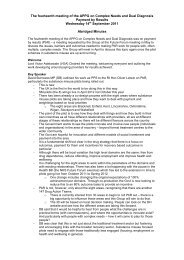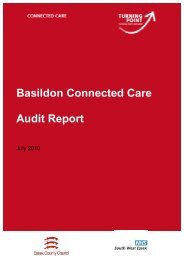Citizen Advisors - Turning Point
Citizen Advisors - Turning Point
Citizen Advisors - Turning Point
Create successful ePaper yourself
Turn your PDF publications into a flip-book with our unique Google optimized e-Paper software.
<strong>Turning</strong> <strong>Point</strong> Connected Care Report 35<br />
It is important to overcome the difficulties faced in Scotland, for example, where<br />
it was felt that the local area coordinators were unable to provide both a service<br />
and community focused model of navigation. One possible way of overcoming<br />
this could be by employing members of the community as they have a natural<br />
understanding of local issues and need, whilst ensuring that they receive in<br />
depth training on the services that are available locally, arming them with quasiprofessional<br />
skills. This is discussed in more detail below.<br />
In addition to the issue of balancing time between community building and<br />
signposting, the report has also drawn attention to other challenges associated<br />
with delivering a <strong>Citizen</strong> Advisor service, such as managing caseload size, and<br />
ensuring that there is buy in for the service amongst local agencies and<br />
organisations. As well as the workload of the <strong>Citizen</strong> <strong>Advisors</strong>, the caseloads of<br />
the services that they are signposting too must be considered. If a <strong>Citizen</strong><br />
Advisor service operates successfully then it may be that organisations cannot<br />
keep up with the demand for the services. Equally, there may be an increase in<br />
benefits claims as <strong>Citizen</strong> <strong>Advisors</strong> help clients to get access to the benefits that<br />
they are entitled to.<br />
7.1 Recommendations<br />
First and foremost, it is clear that any <strong>Citizen</strong> Advisor model must reflect the<br />
local area and the needs of the communities and individuals within it. Therefore,<br />
it is problematic to construct one single model for this type of service.<br />
Below we have set out our recommendations which should inform the<br />
development of a <strong>Citizen</strong> Advisor style service. Central to these<br />
recommendations is the recognition that service delivery should be ‘people’<br />
focused and that communities should be at the heart of both service design and<br />
delivery.<br />
1. <strong>Citizen</strong> <strong>Advisors</strong> should have first hand knowledge of the local<br />
community and/or be experts by experience, not professionally led.<br />
The local community should be involved in the delivery of a <strong>Citizen</strong> Advisor<br />
approach to helping people to access services. The evidence shows that the<br />
relationship between staff member and client is most likely to be successful if<br />
the <strong>Citizen</strong> Advisor has credibility with the service user by being a member of<br />
the local community or by being an expert by experience in the issues facing the<br />
client in question, as illustrated by the village agent programme.<br />
Having a member of the community as a <strong>Citizen</strong> Advisor embeds the<br />
programme in the local area, and helps the local population feel ownership of<br />
the project making it more likely to be utilised as a resource which will build<br />
community resilience. For example, in Hartlepool, much of the success of the<br />
Connected Care service was attributed to the fact that the navigators were not<br />
seen as the Council or the NHS, but as local people. Likewise, the community<br />
mentor element of the Link Worker scheme in Milton Keynes, wherein, people<br />
who have previously used a wide range of services and who have a criminal<br />
background, volunteer to support people in engaging with services, has met with
















